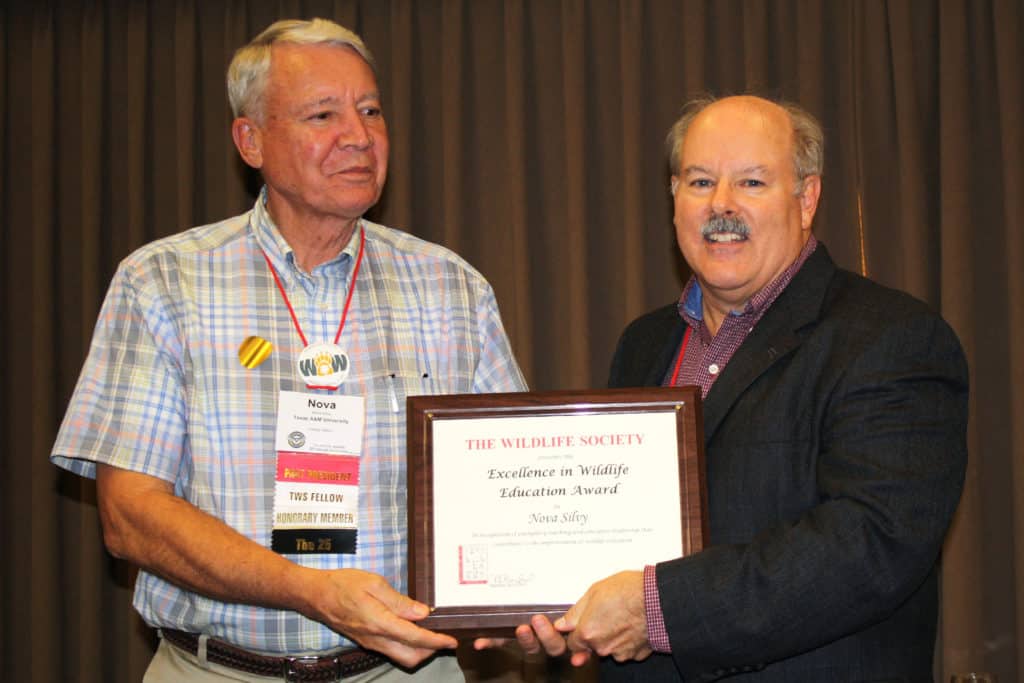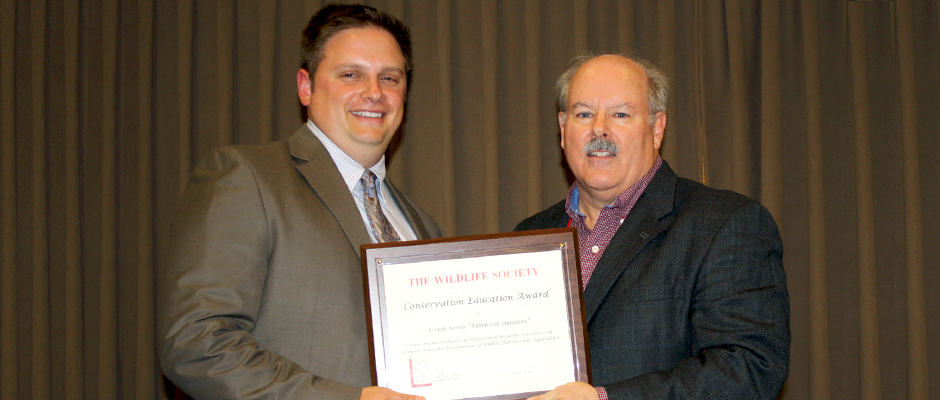Share this article
Award recipients focus on wildlife education
Nominations for the 2016 Conservation Education and Excellence in Wildlife Education Awards will be accepted through May 1. Visit the Conservation Education and Wildlife Education Award webpages by clicking the links above, or visit https://wildlife.org/engage/awards/ to learn more about all TWS awards.
James Cummins was sitting on his father-in-law Arch Dalrymple’s porch one day about 12 years ago when Dalrymple brought up an idea for a book that would offer landowners information on wildlife and fisheries management in Mississippi.
Little did Cummins know that this idea would later become a multiple award-winning book that his father-in-law would provide the majority of the funding for, and that would be used in universities and by landowners in Mississippi.

Nova Silvy accepts the Excellence in Wildlife Education Award at last year’s Annual Conference in Winnipeg.
Coauthors Adam Rohnke, a senior extension associate in wildlife at Mississippi State University Extension Service, and James Cummins, the executive director of the nonprofit organization Wildlife Mississippi, won The Wildlife Society’s 2015 Conservation Education Award for the book “Fish and Wildlife Management: A Handbook for Mississippi Landowners.” They worked on the book with about 33 authors, coauthors and technical editors.
The Conservation Education Award covers a range of activities including writing, audio-visual work, media and programs. One award is given out in each of these categories on a four-year-rotation basis. Rohnke and Cummins received the award in the writing and book category.
“The purpose was to develop a comprehensive guide for landowners, particularly in Mississippi,” Rohnke said. “It was for Mississippi landowners to encourage them to do wildlife and fish conservation on their lands.” Rohnke said they covered information subjects from basic natural history of soils to species groups. “We’re seeing more and more folks inheriting or purchasing land. This can give them a base knowledge to help them manage that property.”
The 400-page book with about 400 images is technically accurate, but not a technical publication, according to Rohnke. “We wanted to really remove all of the barriers and just get the information we really needed to manage the landscape,” he said. “We wrote it for the common person to digest fully.”
So far, the book has received positive reviews. “This is the sort of book that must be in every hunting and fishing camp in Mississippi,” said Donald Jackson in a review in the Clarion Ledger. “It is the sort of book that needs to be on the coffee table or lamp table in every den and living room, at hand when the fires are low and the thoughts are deep.”
Cummins, who is hoping to work on a second edition of the book in the near future, is grateful to be recognized by TWS. “It was a huge honor and is greatly appreciated,” he said, attributing the success to all of the authors of the book.
Mississippi State University also won the award in the writing category for a column that they provide to newspaper outlets in the state providing technical information in a readable way.
Another award that recognizes wildlife educators is the Excellence in Wildlife Education Award. This award, which recognizes exemplary teaching and contributions to the improvement of wildlife education, was presented to Nova Silvy, a reagents professor in the Department of Wildlife and Fisheries Science at Texas A&M University, at last year’s TWS conference.
Header Image: In addition to accepting the Conservation Education Award for the book that he coauthored, Rohnke also accepted the award for article series on behalf of his employer, Mississippi State University.








